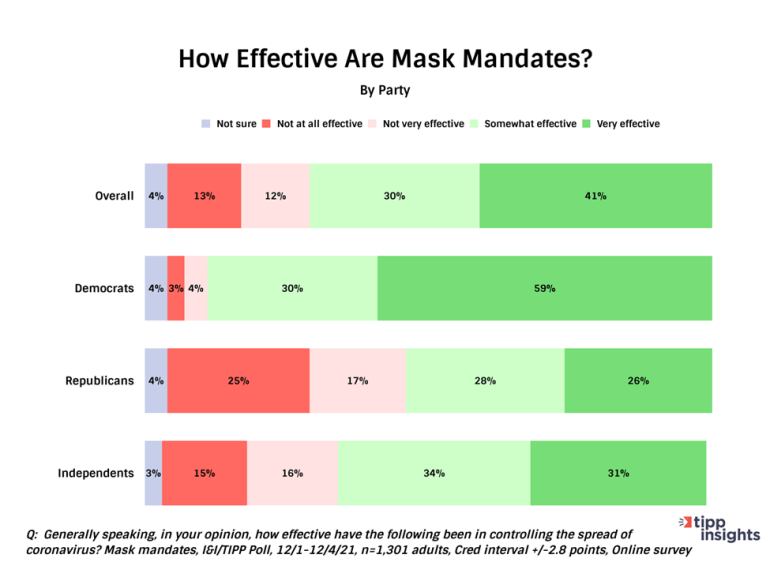I&I/TIPP Poll: Who Are The Real COVID Extremists? Terry Jones
https://issuesinsights.com/2021/12/27/ii-tipp-poll-who-are-the-real-covid-extremists/
To hear the media tell it, Americans are bitterly and broadly divided over COVID-19 and the policies enacted to mitigate its spread and save lives. But while there remain significant differences among political affiliations, the degree of agreement among Americans on COVID-19 policies is noteworthy, new data from the I&I/TIPP Poll show.
Media coverage of COVID-19 this year has often focused on the degree to which the “right” and “conservatives” have refused to heed government imposed mandates and rules to deal with the fast-spreading virus. Coverage, as numerous studies and reports have shown, has been highly politicized.
To find out if this is true, the December I&I TIPP Poll asked Americans “Generally speaking, in your opinion, how effective have the following been in controlling the spread of coronavirus?”
Respondents rated three types of mandates: Mask mandates, lockdowns, vaccine mandates using a Likert scale — Very effective, Somewhat effective, Not very effective, Not at all effective, and Not sure.
Overall, for mask mandates, 72% of those queried said they were effective, versus 24% saying they weren’t. For lockdowns, the comparable numbers were 66% and 29%. For vaccine mandates, 63% to 31%.
The data come from the I&I/TIPP Poll’s survey of 1,301 adults, conducted online from Dec. 1-4 by TechnoMetrica Market Intelligence, I&I’s polling partner. The poll’s margin of error is +/-2.8 percentage points.
The breakdown by political ideology shows some differences, of course. Opinion is never monolithic.
On the topic of mask mandates, for instance, 61% of those who call themselves conservatives describe mask mandates as “effective,” versus 35% who don’t. Among moderates, 75% call masks effective, and 20% don’t. Liberals are the real ideological outlier here: 88% see masks as working, versus just 9% who don’t.

The differences are bigger when it comes to lockdowns. Conservatives by 53% to 42% say lockdowns are effective, while moderates stand at 70% versus 25%. Again, liberals are far higher, at 85% and 12%.

On the increasingly touchy question of vaccine mandates, conservatives still overall call them effective, by 51% to 44%, while moderates come in at 69% to 26% and liberals at 81% to 15%.

Breaking it down by party affiliation rather than simply ideology, one sees little overall difference within each group.
Among Democrats, for instance, 89% see mask mandates as effective, while just 7% demur. That’s very close to how liberals see it.

Republicans by 54% to 42% see mask mandates as helpful, similar to conservatives, while independents go 65% to 31%.
On the question of lockdowns, 85% of Democrats see them as effective, while just 11% don’t. For Republicans, it’s 48% to 47%; for independents, it’s 58% to 37%.

And finally, on vaccine mandates, the breakdown goes: Dems 84% effective to 13% not effective, Republicans 44% to 49%, and independents 57% to 38%. This is the only question that Republicans did not have a majority agreement with the other parties.

And that is the surprising point in this data set: That, among all parties and ideologies, there is majority agreement on the effectiveness of the policies that have been pursued so far to deal with the spread of COVID-19 and its growing number of genetic variants.
The agreement varies only by degree. Significant numbers of people on the right and the center have reasonable objections to COVID policies, such as mandatory vaccines for children, that politicians would be wise to heed.
Indeed, of all the political groupings tracked by I&I/TIPP, the only groups that show virtually no objection to the most draconian masking, vaccination, and lockdown policies are the Democrats and their ideological kin, the liberals.
Ironically, those same groups were strongly anti-vaccination when President Trump made his big push in 2020, but today with both the White House and Congress controlled by liberal Democrats, are the strongest proponents of sweeping government anti-COVID measures, including lockdowns and vaccine mandates.
Unfortunately, this overarching majority agreement is muted or ignored by the mainstream media, which from the beginning has politicized the government’s COVID-19 response. Those who disagree with or oppose individual policies pushed by the current administration, especially on the new Omicron variant, immediately get labeled as “fringe” or “right wing,” or even “conspiracy theorists.”
Yet, even some center-liberal groups and think tanks today are backing away from the politically polarizing formula applied by the media to all things COVID. And, when it comes to COVID-19 policy, liberal Democrats are the least nuanced and differentiated in their views of all.
“We found no evidence that closing all non-essential businesses, for example, reduced the growth in deaths, and yet these policies predict worse economic outcomes, measured in several ways,” noted a recent Brookings Institution report. “A growing number of economists and policy experts are starting to question the wisdom of stay-at-home-orders and other extreme measures.”
And literally hundreds of other studies and research reports agree.
As our data suggest, when it comes to COVID-19 policy, liberal Democrats are the least differentiated in their views of all the major political groupings. Though the media appear blind to that, it’s a far clearer sign of politicization on the issue of COVID than the more nuanced takes of the conservatives and moderates. The left are the real extremists on this issue.
As a New Year arrives, I&I/TIPP will continue to provide timely and informative data from our monthly polls on this topic and on others of interest. TIPP has distinguished itself by being the most accurate pollster for the past five presidential elections.
Terry Jones is an editor of Issues & Insights. His four decades of journalism experience include serving as national issues editor, economics editor and editorial page editor for Investor’s Business Daily.
Comments are closed.
